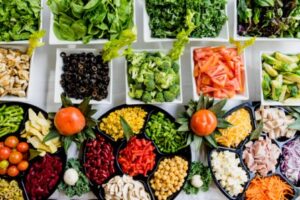
Week two of my time on the 21-day cleanse is wrapping up, and I am 8 pounds lighter, with eyes whiter and skin clearer, energy renewed through better sleep and purer food for fuel, and a positively outrageous permanent smile plastered to my face that is part sinful pride at having stuck with it this long (a record for me!) and part uncontrollable giddiness at how much better I feel.
You never quite appreciate the fact that the foods we eat, aside from largely determining our outward appearance, also directly impact hormone output, the brain’s chemical response and our genes turning on and off (the study of this phenomenon is called epigenetics, and it is fascinating) until you sample for yourself the complete change from when you are eating out of convenience to when your body is running on premium fuel.
Now, even though I feel wonderful and fully intend to pull parts of this program into my permanent eating habits — I think reducing dairy, meat and processed sugar/wheat consumption would be a good move for everyone looking to avoid unnecessary allergens and potentially toxic additives — I admittedly am looking forward to not being “on” anything.
I know it is a health-supportive cleanse, but being “on” a specific eating plan always conjures bad memories of all the horrible fad diets I tried when attempting (unsuccessfully) to lose weight as a teenager before I wrote “The Dorm Room Diet.”
I finally was able to lose the weight, but only when I dropped all the restrictive eating regimens and turned instead to a healthy lifestyle plan of my own creation, which, at its core, is all about putting food in perspective and making sure that “we the eaters” are always in control. To maintain this power balance, I would prefer just to take the excellent health cues this cleanse provides and incorporate them into my daily routine without there being some big to-do in which I have to be aware of the foods I am “not permitted” to have.
But for undoing bad habits — especially the ones I adopted during the holidays that have completely warped my previously good grasp on how much is too much of a good thing — and proving to myself that I have the willpower and strength to course-correct, I find that a proper, full-blown cleanse is the best solution, even if it means living by rules for a little bit.
And seeing as we’re on the subject of rules: Sometimes we have to be our own parents. Your mother or father probably forced you to eat broccoli over and over before your taste buds finally acquired a taste for it, but as an adult, you are now in the position to dictate what your taste buds will learn to love.
Yes, our tastes are learned! True, we are hard-wired biologically to crave sugar, salt and fat because these things in the wild signal great sources of nutrition that our ancestors needed to survive. But the sweetness that comes from a juicy pear is nowhere near the overload your tongue experiences when you sip a soda or eat a candy bar. It’s all about perspective and about weaning yourself away from the hyper-stimulation and appreciating instead the natural spectrum of flavors that are perfect 95 percent of the time. (What you choose to go crazy with the other 5 percent of the time is between you and that box of glazed doughnut holes.)
When I decided to embark on this journey — and it truly is a journey to break old habits, because your own nature will fight against you — it was not because I had any major health concerns, thank goodness. It was not even for weight loss, though this is often an added benefit of reimagining your daily diet to include more whole foods and fewer things that come out of a package. Instead, this three-week cleanse was meant to retrain my taste buds out of their learned addiction to too much processed sugar and flour and, ultimately, to get back to a place where the rules are thrown off and I am back in control.
This article was contributed by Daphne Oz.
 Related Articles & Free Subscription
Related Articles & Free Subscription
The Dangers of Trans Fat in a Diet
Too Much Eating Out Creates Many Problems






Comment here